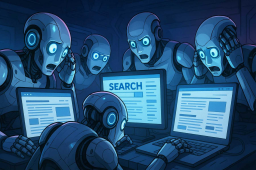Some Experiments into How Google's Crawler works
Why experiment with Googlebot Beyond the fact it is interesting to understand how it works, it is potential useful if you ca...
Expert insights, guides, and tips to improve your website's SEO performance
You know the scenario. It's January and all of a sudden several people start proclaiming "SEO is Dead". There's so many people doing this that you even start to believe them. Just like brand recall in marketing, this is partially the same people saying it over and over again because you're more likely to believe it. But it's also partially a number of people jumping on the controversy bandwagon. In recent times the latest clickbait has become to declare something "dead", often with an attempt to sell an alternative. This is also known as "controversy marketing". Controversy marketing is a high risk marketing approach which is deliberately controversial in order to generate chat and buzz around a statement in the hopes of generating publicity for a brand or sales.
But there's a risk with controversy marketing. Those using it, who have built up a trusting base of social media followers, are deliberately telling them untruths to generate this buzz. That audience, of course, likely contains their customers and certainly potential customers. If caught out, then the trust they have built up is lost. They're no longer believable. And in the world of SEO, trust and believability is everything.

Search engine algorithms are not static, but they change over time. This variable nature is less predictable than a fixed algorithm and system. In one update some sites do well and others poorly, in another the opposite may be true. Of late this variability does seem to be extreme, which makes the measurability of the long term benefits of any SEO changes difficult to estimate. An issue then is that statements like "SEO is dead" are clearly false, but simultaneously hard to categorically show as wrong. That said, we don't need to as those claiming "SEO is dead" rarely offer justification for their claims. At best you will see one misinterpretation of cause and effect, most often nothing. You're brain fills in the gaps "we'll, there's certainly a lot of variability, and there do seem to be a lot of sites losing traffic, so it must be true".

Technologies are advancing and one thing we've seen a lot of lately is more capable AI systems. I say "more capable" rather than good here, because the performance of things like Large Language Models is impressive but ultimately not much better than asking a 5 year old. To understand this, we just need to understand the very basics of how they work. The neural networks that make up AI simply encode mathematical functions. What makes them unique is that these functions are trained, rather than explicitly programmed as a sequence of steps by a programmer. There should still be some debate of whether this is intelligence, but an interesting characteristic is that it runs a function that the programmer(s) don't understand everything it is doing! That's pretty cool. A Large Language Model splits text in to tokens. Then, essentially, all it is doing is saying "given the previous tokens, what tokens have the best chance of coming next" and it picks one. Rinse and repeat and you have some output text. By using a vast amount of training data, it turns out they can get very good at predicting what tokens likely come next. But there's some interesting things about this that make even a 5 year old better. It can never be creative. Further, in the context of what you type in to start it going (the prompt), it can never be particularly creative. The output is always going to be somewhere around the average of what would normally come after the prompt. Unfortunately this average and lack of creativity is self re-enforcing, as they're used to create text that is placed on the internet they will inevitably end up training on other AI's data - re-enforcing that average.
When we consider AI and SEO, there are two potential claims that are relevant. The first are that human created pages aren't necessary because these AI LLMs can answer everything. They can't, at best they're locked in time at the time they were trained. To overcome this and the problem of self-enforcing the averageness of AI output, it's in the AI creators interests to ensure that webmasters can and want to generate new content. The claim you'll see is that AI is replacing websites in the search results. Because of what we've talked about with AI LLMs needing new content to improve, these link to the original sources. That won't kill SEO, but it may change it. It's highly advantageous to be linked from those AI answers. Think about it - you're making better than average human written pages, the AI response in the search engine is at best limited to average because of the way the algorithms work. The interest level of the user that clicks on those links is astronomical, and they've landed on your far superior page.
Developments in technology, especially AI, tends to happen in big jumps. Each jump is successively harder to make than the last one. That we've just made a big jump, doesn't mean the next jump is imminent.
The basics of SEO have been around for ages. Write good content. Ensure your site is technically good. Get organic links. These all still work. They're about creating a great user experience for your users and being the sort of site people want to link to and search engines want to show. Even if the search engines sometimes get their algorithms wrong, in the long term this work is what benefits you. Sure, it may sometimes seem like it isn't working in the short term, but SEO is and always has been a long term benefit.

The harm these false claims do is also not to be underestimated. Often it's used to sell non SEO tools, often AI tools, that simply put don't work and in those cases there is the obvious direct harm. But they breach the trust of those they are speaking to and those believing the claim they eliminate one of the best ways for small and medium sites to build and get traffic, which compounds, over the long term. An issue is that the SEO field isn't devoid of predatory people. There are companies, agencies, and tool builders that charge many many many times what their product and services are worth and many of those are very well known and very popular. It's easy to suggest that SEO is expensive and doesn't drive traffic in the short term, so why bother? But that ignores that amount of SEOs and tool builders (like us) that genuinely want to help small and medium sites drive traffic, where the costs are reasonable and nearly always work out to be the cheapest form of traffic in the long term. The potential for SEO to grow small and medium businesses is, and always has been, huge. Play with whatever these "SEO is Dead" proclaimers are selling if you must, but be wary of missing out on something that is actually, you know, proven to work in the long term. Because, well, you're competitors probably aren't using what the "SEO is Dead" proclaimers are selling, but they are using SEO!
Far from SEO being Dead, let me suggest that controversy marketing is dead! One of the glimmers of hope in this whole situation is that the "SEO is dead" and similar controversy marketing techniques still works, but it's getting less effective as people get wiser to it. It's like the silly people who just ask dumb questions on twitter to get engagement, over time everyone else starts to work out what is happening and gets bored of it. Betraying the trust of your users, potential users, and followers, is always going to be a short term strategy to oblivion.
Start with a free crawl of up to 1,000 URLs and get actionable insights today.
Try The Crawl Tool Free
Why experiment with Googlebot Beyond the fact it is interesting to understand how it works, it is potential useful if you ca...

LLMS.TXT again I've written about LLMS.TXT in the article about how getting one listed in an llms.txt directory mysteriously...

What's this about Adding Other Media to robots.txt I recently came across John Mueller's (a Google Search advocate) blog. I ...

Understanding the Importance of having a fast Mobile website I, personally, spend a lot of time focusing on site speed. The ...

What are robots.txt, sitemap.xml, and llms.txt These files are used by search engines and bots to discover content and to le...

AI Crawlers and Citing Sources The rise of AI, rather than search, crawlers visiting websites and "indexing" information is ...